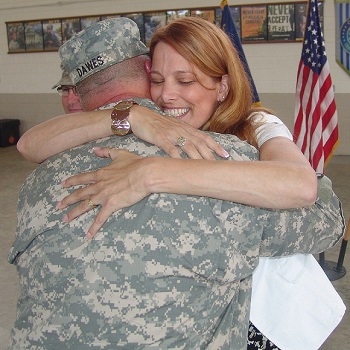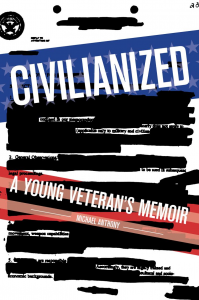Why does my military spouse have PTSD?
Do you have any idea what PTSD is? Let’s paint this kind of picture: A young man is on verge of graduating on high school. He had a good family and decided to serve the country as a military man. Before he entered the military school, he has no prior history of mental health issues or substance abuse. He successfully joined the military and was given the combatant role. He was trained with the only purpose of striking out violence for the benefit of his country. He was repeatedly placed in situations where he strikes out violence and is rewarded intrinsically, extrinsically, and monetarily. The wartime traumatic events exposed him to the stress that leads to the PTSD (Post Traumatic Stress Disorder) development. He then leaves the military service and is anticipated to leave everything behind with a small transitional aid. The post-traumatic disorder makes the life and transition difficult. Drug and alcohol abuse helps ease those kinds of symptoms. He then becomes very dependent on drugs and alcohol decreasing his ability to effectively cope up and increasing his problems. This young man, who happens to be your spouse, is now in a very dangerous place socially, physically, and mentally. His coping skills still consists of substance abuse, violence, and compartmentalizing, which are signs and symptoms of PTSD that can lead to legal and family problems.
According so some researches about post-traumatic stress disorder, it has a high correlation to substance abuse. As a matter of fact, 34.5% of post-traumatic disorder diagnosed men have problems on substance abuse, specifically with drug, and 51.9% post-traumatic disorder diagnosed have substance abuse related with alcohol; figures that qualifies nearly all our returning veterans with post-traumatic disorder perfect for treatment for substance abuse. Other researches showed that 4 out of 5 war veterans that have suffered from post-traumatic disorder have re-occurring disorders of substance abuse.
The fact that there’s such a huge correlation is not really surprising, especially to those patients who completely knows or deals with PTSD patient, but many people still ask why this’s the case. Actually, there are 3 theories that the researchers established with the high correlation between the substance abuse or drug and alcohol addiction and Post-Traumatic Stress Disorder. The research supports the entire theories by differs among the demographic of post-traumatic disorder.
High Risk Theory
This theory on high risk states that the drug and/or alcohol addiction occurs before the disorder’s development. This has the idea that the abuse on substance leads to the activities with high risks and that or some of these events lead to PTSD development. While this may be true to some cases, the military veterans aren’t likely to be taking drugs and/or alcohol during or prior to the traumatic combat events or experiences.
Susceptibility Theory
Another theory is the susceptibility theory which states that there’s something with the drug and/or alcohol abuse that increasing the susceptibility of a person for post-traumatic disorder development following the traumatic experience. While it’s not exactly known what this might be there are available theories for review before doing further research. The substance abuse does alter the normal structures and functioning of systems in the body; these kinds of facts are the grounds for this theory’s foundation.
Shared Vulnerability Theory
This theory states that some of the people may possibly have genetic vulnerability that leads to develop both the substance abuse and PTSD after a traumatic experience. This also states that patients might develop both of the symptoms after the traumatic experience, while some who lacks this susceptibility in genetic might not.
Self-Medication Theory
This states that the people who are suffering from the post-traumatic stress disorder use substances in order to cope up with the symptoms and signs of the disorder. For example, the individuals might use the euphoric drugs in order to deal with their depression, or utilize depressants such as benzodiazepines or alcohol in order to deal with the anxiety. Either of the ways, these individuals use self-medication methods in order to deal with the PTSD distress. This theory is based on the actual conversations of the author to the veterans and the personal experience that this’s case with most of the returning military veterans that suffers both conditions.
Regarding what theory applies to your spouse, there’s a definitely correlation between the post-traumatic disorder and substance abuse; many of these happens especially with our returning military veterans. Often, they find solace by drinking alcohol and using drug in order to cope up with the distress but over time, they will only find that their problems have just increased. These individuals will lead to chemical dependencies which in time will be too hard to control.
PTSD in our military spouses has been shown to display itself through hardship in controlling the irritability, anger, self-medicating with drugs and/or alcohol, and the high risks and reckless behaviors; an old concerning group of problems that are only aggravated by drugs and/or alcohol dependency. Now, cover this with an altered moral state and decreased inhibition that is developed in the mind of all combatant and much more problems develop. This is a kind of individual that is in great need of comprehensive care, yet many still go untreated.
Why are there are too many veterans that suffer from this disorder? Don’t they want to get better? Do they lack enough knowledge in order to understand what’s really going on? Are we, people in the society not effectively doing our part for them? It’s very important for these individuals to seek services though capable medical institutions to handle both their PTSD and substance abuse.
Civilianized: A Young Veteran’s Memoir
In this dark humored War Memoir, Iraq veteran Michael Anthony discusses his return from war and how he defeated his PTSD. Civilianized is a must read for any veteran, or anyone who knows a veteran, who has returned from war and suffered through Post-Traumatic Stress Disorder (PTSD).
“I wont soon forget this book.” -Mary Roach
“A must read.” -Colby Buzzell
“[S]mart and mordantly funny.” –Milwaukee Journal Sentinel
“Anthony delivers a dose of reality that can awaken the mind…” Bookreporter
Order your copy of Civilianized: A Young Veteran’s Memoir .
Photo: Flickr/NCNGPAO

